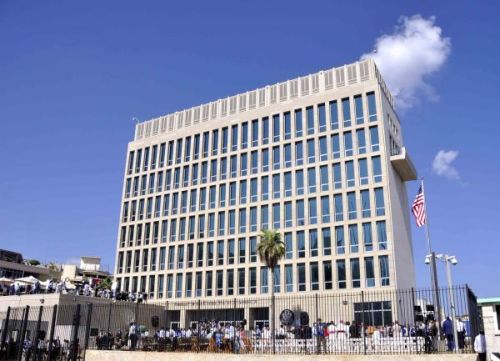 Cuba and the United States entered a new stage of bilateral rapprochement, after completing formalities of resuming diplomatic relations with the reopening of embassies in both capitals.
Cuba and the United States entered a new stage of bilateral rapprochement, after completing formalities of resuming diplomatic relations with the reopening of embassies in both capitals.
Cuba US Announce Creation of Bilateral Commission
John Kerry Presides Over U.S. Flag Hoisting Ceremony in Cuba
The visit made this Friday by U.S. Secretary of State, John Kerry, to the island and the hoisting of the U.S. flag here, put an end to an initial stage in the way to normalization, announced last December 17 by Presidents Raul Castro and Barack Obama.
Even though on July 20 were restablished the links and reopened the respective diplomatic missions, in a ceremony that included hoisting the flag in Washington D.C. of the solitary star, there was still to raise the star-spangled banner in Cuban soil.
According to both governments, a longer and more complex process begins now, that with respect to sovereignty and non-interference in internal issues will allow the coexistence between neighbors, marked by the recognition of the existing profound differences and the will to work together in issues of common interest.
In a joint press round held at the emblematic Hotel Nacional, Cuban Foreign Minister Bruno Rodriguez reiterated the disposition of the greater Antille to discuss any issue on the basis of mutual respect.
On his part, Kerry expressed the Obama Administration’s determination to ”look forward” after saying during the hoisting of the flag the will to ”draw nearer as two neighbor peoples, not as enemies or rivals.”
THE NEW STAGE
Rodríguez and Kerry announced the activation of a bilateral commission in charge of defining the topics to approach in the new statge, among them the issues pending after more than 50 years of growing apart, characterized by the blockade imposed on the island and the purpose of applying to it the same doctrine of the change of regime.
The joint group will begin working next month, with the experience of negotiations that led to the restablishment of links and reopening of embassies, talks described as serious and constructive by the parts. For Cuba, there cannot exist normal links between two countries if one of them keeps upon the other an economic, comercial and financial siege, it it illegally occupies part of its territory (Guantanamo Naval Base) and insists on destabilizing it.
On that regard, the Secretary of State recognized the need to lift the blockade and reiterated Washington’s commitment to end the siege -which is technically in the hands of Congress- but discarded to approach in the near future other worries of Havana.
According to Kerry, there are many complex issues on the table that have to be prioritized and areas in which progress can be achieved more easily, ‘although we do not reject any topic that could emerge in the process.’
Both officials also mentioned the interest in talking about the issue of compensations which Cuba claims for the damages caused to the island after decades of aggressiveness on the part of the U.S., while they claim payment for the nationalization of properties of their citizens.
Rodriguez asserted that Cuban laws include that figure, applied to compensate all foreigners affected by revolutionary measures except for those of the U.S. as the Washington hostility against the process that triumphed the first of January, 1959, made it impossible to do so.
ISSUES IN THE AGENDA
The Cuban Foreign Minister received Kerry in the Ministry headquarters, where they talked about relevant topics for both countries.
‘We agreed on the importance of opening new áreas of dialogue, consolidate bilateral mechanisms of cooperation already created and explore and open new ones in different áreas, as the environment, health, science and the compliance and application of the law’, said Rodriguez.
The U.S. Secretary of State is the first to visit Cuba since Edward Stettinius did so in 1945. Kerry also stressed the need to discuss about anti-drug struggle, maritime safety and civil aviation.
 Escambray ENGLISH EDITION
Escambray ENGLISH EDITION





Escambray reserves the right to publish comments.